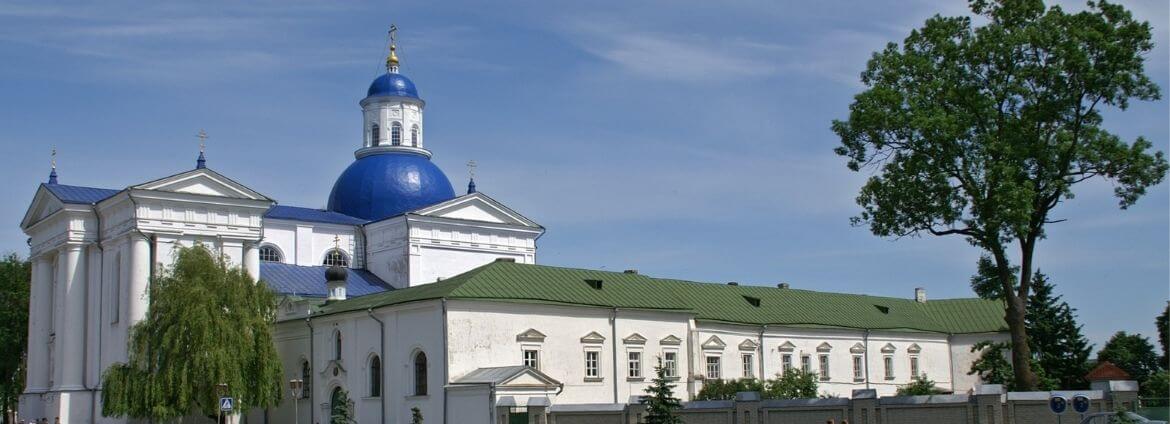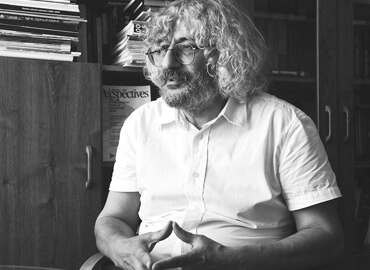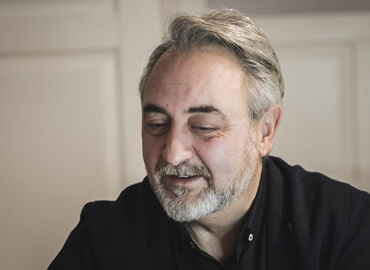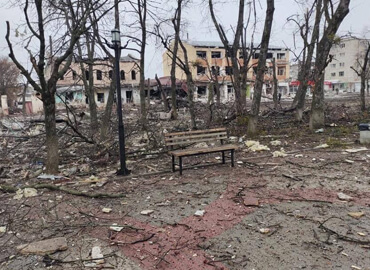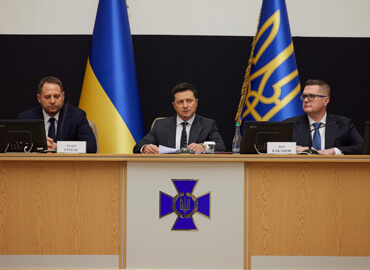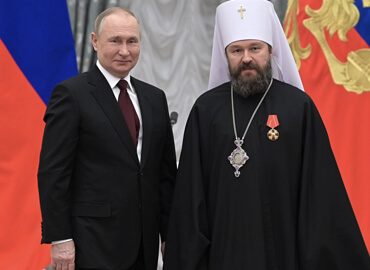On June 2, Natalya Kochanova, one of those close to the former President of Belarus Alexander Lukashenko, visited the Zhirovitsky Holy Dormition Monastery. The purpose of the family visit was to congratulate her fellow countryman, Polochin native Archbishop Guria, on his birthday, while at the same time meeting with the clergy to discuss with them her vision of the political situation and the regime’s expectations relative to the Orthodox Church. This meeting was the second in a series of diocesan visits by Kochanova to ideologically “brainwash” Orthodox priests. Those deemed “unreliable” were not allowed to the meeting, so as not to spoil the idyllic picture and to not have them pose uncomfortable questions.
This unremarkable meeting would not have been worth mentioning four months after it took place if not for the consequences suffered by the local community of the agricultural town of Zhirovichi. It is with this meeting that the journalists of Radio Ratsiya have connected the shift of education in the Zhirovichi secondary school into Russian at the request of an instructor at the Minsk Theological Seminary, Father Yevgeny Solonkov (scroll to 3:05 in the video).
First, it should be noted that despite the fact that the educational process at the school was conducted primarily in Belarusian and that on the school’s website it is still written in Belarusian Dzyarzhaunay ustanovay adukatsi «Zhyrovitskaya serdnyaya shkola of Slonimskaha rayona» (Public education institution «Zhirovichi Secondary School, Slonim Region»), studying the news from this site and photos from school events it is granted that communication between children and teachers outside of class during the school day and during recess was in Russian. For example, during Belarusian language days, an activity called «Say Hello in Belarusian» was conducted, the slogan for which was «Give Russian a rest! Speak Belarusian!» As part of the activity, children received candy simply for greeting people with the words «good day», «good morning» or «hello» in Belarusian. That is, such greetings were considered unusual or as an exception at school and as something worthy of being rewarded with candy.
Except for Belarusian language and literature days, the Belarusian folklore holidays Maslenitsa and Gukanne viasny, and individual class hours in Belarusian, in school events in which children and teachers participate Russian-speaking people dominate, many of whom have an ideological background. There are class hours devoted to the subject of the «Day of Unity of the Peoples of Belarus and Russia» and there was a meeting of participants in a rally in support of the Lukashenko regime in November 2020, and then in September 2021. There was the project titled The Knight and Keeper of the Russian Language dedicated to S.I. Ozhegov, and patriotic-themed events in terms are held according to the framework of the regime’s ideology.
Second, Father Yevgeny Solonkov, whose children study at the Zhirovichi school (his daughter Marina, as can be seen from the news section of the school website, took part in the «Hello, world!» competition) and whose wife worked there until recently as a teacher, went to Natalya Kachanova complaining that the teaching at the school is conducted in Belarusian and requested assistance in turning the educational process towards that of the great and powerful neighboring state. Over the summer, documents began to be hastily translated into Russian, and indeed, from the beginning of the academic year, the curriculum had been Russified.
Third, many could not share the joy of the priest Yevgeny Solonkov regarding the change in the status quo. The administration dropped this decision from on high in the summer and they had to prepare all summer for shifting to Russian language while changing teaching materials, which involved real costs. Teachers had to change their old plans, and other clergy parents who live in Zhirovichi and whose children attend the local school have also expressed their displeasure.
The public has fewer questions even about the transition of the school into another language than how it was conducted – through the initiative of one of the parents, expressed in a private conversation with a government representative whose competence does not even include the system of education system, and without a democratic discussion among all interested parties.
There should be more questions here not to the parent taking initiative who has their own interest in the language of instruction of their own children, but to Natalya Kochanova, who enthusiastically turned on an «administrative resource» to abolish the Belarusian language at a specific educational institution. Nevertheless, the Russification of the Belarusian school, initiated by an Orthodox priest, is fixed in the image of a «Russian priest» or servant of the «Russian world,» and which, in this sense, makes almost the entire Belarusian Orthodox Church (BOC) hostage to this image of an «agent of Russification.»
At the Zhirovichi Seminary itself, from which Father Yevgeny Solonkov graduated, several subjects were taught in Belarusian from its founding and there were Belarusian language courses in different groups for Belarusian and foreign students. If the latter, following a year of study in Belarusian, did not speak it, at least they understood it sufficiently well to study other subjects in Belarusian. The language of instruction depended on the teachers themselves and were free to choose the one that was more comfortable for them. Among Belarusian-speaking teachers have been the following: Archpriest Sergiy Gordun is now the first vice-rector of the Institute of Theology at Belarusian State University and in September 2020 served as an expert for Belarusian Dumka on the situation in Belarus; Father Georgy Sokolov (Archimandrite Athanasius), following the dismissal of Archpriest Sergiy Lepin, was acting chairman of the Synodal Information Department of the BOC and is now the rector of the Minsk Theological Academy, appointed under Metropolitan Benjamin; Ales Viktorovich Korol is now the head of the department of theology at the Minsk Theological Seminary and has been selected to succeed Metropolitan Benjamin; Father Fyodor Krivonos, a researcher of the history of the Belarusian Orthodox Church and Soviet repressions against clergy and believers, who died in early June this year.
In 2002, the now famous Grodno archpriest Georgy Roy, one of the key figures of the Belarusian Orthodox democratic movement, and a then student and editor-in-chief of the student magazine Stupeni named Yuri, wrote in the editorial column to Issue #6 of the magazine a piece entitled «The National Question: Would you like to respond?» (which was a response to a letter from Sergei Krivosheev, a student at Belarusian State University) concerned about the absence of the Belarusian language in the Belarusian Orthodox Church in general and in the Zhirovichi Seminary in particular:
«First, we, students of the Theological Academy and Seminary, were surprised by your confidence that there is no Belarusian language among seminar disciplines and that all subjects are taught in Russian. This is totally false. In addition to the fact that Belarusian is studied as a separate discipline in the first and second years of the Seminary, it is also used in courses on Church Slavonic language, pastoral theology, practical guidance for pastors, the history of the Russian Church, and the history of the Belarusian Church, among others. The history of Belarus is taught as a separate discipline. Approximately 40% of graduates’ diploma research topics at the Seminary are devoted to the study of the history of the Belarusian Church. There are studies on Belarusian folklore. Considering all this, we can talk about the contribution of our Divinity Schools to the development of Belarusian theological terminology.»
At the same time, student Igor Vasko, now the new head of the Synodal Information Department of the BOC, interviewed Fr. Sergiy Gorduna in Belarusian on the problem of Belarusian language and the Orthodox Church and on the Russification that has taken place over the centuries and that was especially intensive during the Soviet era. In the interview, Fr. Sergiy Gordun asserted that the Orthodox Church could work more actively towards «soft Belarusianization» and urged seminary students and theological faculty to actively participate in the translation of theological books into Belarusian, stating «It is obvious that the church life of Orthodox Belarusians should become more and more Belarusian.»
Despite the excesses like the shift of the school into Russian, the life of the Orthodox Church is indeed becoming more and more Belarusian. Over the past twenty years, the use of Belarusian language in worship has significantly expanded. Many clergymen not only speak fluently, but also use Belarusian in everyday and liturgical life. More choirs can conduct services in Belarusian, the geography of churches where Belarusian-language services are held is expanding, and many Orthodox activists communicate on social networks and in chats in Belarusian.
As practice has shown, the spread of the Belarusian language in the Orthodox environment is influenced not so much by decisions «from above,» or by symbolic «candy» for «good day» and «hello» in Belarusian, but through the producing of high-quality Belarusian-language content for this sector; when possible, within the framework of subordinate structures and initiatives.
The socio-political crisis that developed in Belarus in 2020 became favorable for individuals or organized groups in obtaining preferences for themselves and in promoting a certain ideological agenda. Positioning themselves as loyal to the regime and seizing the opportunity, such individuals and groups can seek solutions that are expedient for them. In this way, Father Yevgeny Solonkov managed to shift instruction for an entire village school into another language to make it convenient for him and his children. St. Elisabeth Convent is now similarly trying to block the adoption of a domestic violence law. The regime now and then has to «feed» these loyal and supportive people and communities, even though these actions may generate discontent elsewhere. No matter how small and insignificant these individuals and groups are in society, they still manage to manipulate officials for their own purposes who then become hostages of this loyalty.
Материал доступен на русском языке: Как средняя школа в Жировичах перешла на русский язык



